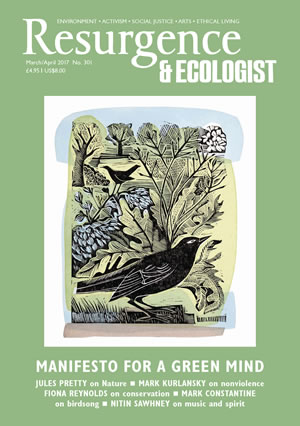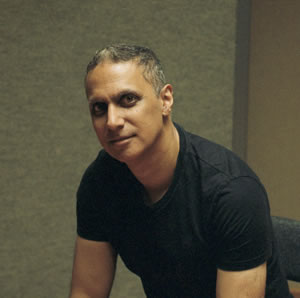Nitin Sawhney is a musician whose diverse influences, ability to transcend cultural barriers, and prolific output have won him international recognition. His work reflects an extraordinary range of interests, including spirituality, social justice, education and – increasingly – Nature.
Sawhney’s recent achievements include scores for BBC Television’s Wonders of the Monsoon and Human Planet, working with the City of Birmingham Symphony Orchestra on a new Animal Symphony, and scoring Jungle Book for Warner Bros. Appropriately, I caught up with him at the Wildscreen Festival in Bristol.
You’ve said music has always been about language for you. Can you elaborate?
Music is the language of emotion and of our souls. Any art has to start with catharsis; otherwise it ceases to become art and it’s just communication of something, or entertainment. For me, the music I make when I’m commissioned isn’t art: it’s serving a function. If I’m writing music for my albums, for me it’s art. It’s creating something from a feeling within. I engage my brain in a different way.
How did you first get into music?
My mum was given a piano by a local church. As soon as I saw it – I was about four or five – I fell in love with it! I did all the classical grades when I was very young, and then got into playing other forms. When I was eight I first heard the jazz trumpeter Miles Davis and I really enjoyed that. I was also listening to a lot of Indian ragas from Pandit Ravi Shankar and others. Simultaneously I was drawn to the guitar. My dad had a very eclectic record collection, with music from Cuba, Spain and India. There was a flamenco guitarist called Philip John Lee who toured with Paco Peña. When I was twelve I went to London to get lessons from him.
Where does your sensitivity to social injustice come from?
It’s very simple: I think every human being is equally valuable. I’ve always felt that. But the world doesn’t work that way. You look at what has gone on here with the aftermath of Brexit and the xenophobia, the crazy, rabid racism of a lot of people who are supposed to be commanding our respect. People make themselves less valuable by being aggressive or crazy, but intrinsically we are the same value, whoever we are or wherever we’re born.
Do you think being bullied at school had some impact on the way you perceive the world?
I think it disrupted that perception that every person is equally valuable, because for a time I was forced into the belief that I wasn’t of equal value. But if you go through that phase, you build yourself back up. That takes time, and for me part of that process was making albums: ways in which I expressed feeling about what happened when I was young. That’s where all the creativity is; that’s where it comes from.
Has your childhood made you more sensitive to what’s happening in the world?
Definitely. I get angry about social injustice. I get very angry about bigotry and politics and misogyny. I get very angry when I see the resurgence of racism.
Beyond music, in what other ways do you engage with those causes dear to you?
I’m a patron of Artis, which works with children to help give them a more creative way to understand the world. Another thing I like is to teach children to do up to their 30 times table in their heads. I can teach anyone in a minute and a half!
How did you meet Nelson Mandela?
I met him when I was travelling. I’d just read his autobiography, Long Walk to Freedom. I was signed to V2 [Records] at the time. They asked why I wanted to travel round the world, and I’d said it’s partly because I want to meet incredible people. And they said, well, we can organise for you to meet Mandela. When I went to meet him at his house, he was very humble and very funny.
I remember I was talking to him about how he felt that the future of South Africa was in the children – in their education – when his PA came in to talk to him. She said: “Madiba, I have President Mbeki on the phone to speak to you.” And he looked at me, and he said, “How many more questions do you have?” I replied, “Two or three,” and he said to his PA, “Could you ask him to call me back in ten minutes?” Which was very humbling, because it made me realise that he saw everybody the same. As equals.
You spent a year travelling to explore wider ways of thinking…
I wanted a different perspective from when I was writing Beyond Skin [Sawhney’s album, which explored themes around identity]. I wanted to try and find a much wider way of thinking. I wanted to question the nature of development. We think we live in the developed world, but I don’t think that’s the case. I think true development is something we’ve lost a sense of.
Mundawuy Yunupingu [an aboriginal Australian elder Sawhney met on his travels] said he believed that when you could fight against colonisation of the mind, you’d develop. I find that interesting: he’s saying that he doesn’t like anybody else trying to take over his feelings or thoughts or manipulate his sense of identity. If you follow your intuition rather than being controlled by your environment or your context or other people as well, then you develop. I think that makes perfect sense…
You’ve quoted jazz saxophonist John Coltrane as saying “Improvisation is like a bird captured from the air…”
I also said that Pandit Ravi Shankar said you are a medium through which the raga manifests. Michelangelo also said that the statue is hidden in the stone. So you have this idea that you discover rather than that you create. It’s already there, waiting to be seen. It’s like there are lots of coincidences around us all the time: we just have to be open to them and attuned.
That to me suggests a belief that we’re more than just a phenomenal world…
Yes, absolutely. There are many things that have happened that I can’t explain, that are way beyond reason or rationality. But at the same time I wouldn’t try to know them. Einstein said his ambition was to know the mind of God. I wouldn’t understand the purpose of that. You can’t possibly understand the design of what’s going on.
What’s your relationship with Nature?
Well, Nature is everything. I like Nature walks, I like being by the ocean whenever I can, I love being around water.
Are you a tree hugger?
No. It’s interesting, because there’s a quote in Zen and the Art of Motorcycle Maintenance where the author [Robert M. Pirsig] says Buddha is not to be found only in the petals of a flower, but also in the circuits of a computer, which I think is absolutely true.
Nature is everything. This whole room [pointing to the hotel lounge] is an organisation of Nature. It’s still Nature. Nature can be cruel. And the way we manipulate Nature can be selfish. But it’s still Nature. All the bad is Nature as well as the good. I think sometimes there’s a Disneyfied perception of what Nature is. I think Nature is visceral and at times alarming and dangerous.
Tell me about the Animal Symphony you recently recorded with the City of Birmingham Symphony Orchestra…
It’s a symphony based on animal sounds, movements and responses. I was commissioned by Sky Arts for a documentary, and it was something I found really interesting. I’d just read The Great Animal Orchestra by Bernie Krause. I love this idea of Nature being divided into the geophony, the biophony and the anthrophony. He says the world of sound comes from these three sources. Geophony is natural sound, like the sound of ocean waves, the sound of thunder. Then you have biophony – animals and plants – and anthrophony, which is people making sounds.
There’s a quotation from Plato at the end of the Natural World Symphony (broadcast on BBC Four in 2007), for which you wrote the music. It reads: “This World is indeed a living being, endowed with a soul and intelligence…a single, living visible entity containing all other living entities, which by their nature are all related.” What are your own views?
I think there is a design, but I don’t know if I would personify or anthropomorphise anything like that. I do think it would be incredibly arrogant of us to assume that we are the only examples of consciousness.
Life on Earth is the only example that we have an awareness of, but I think the universe itself is conscious, because we are a part of the universe. I think that’s one of the issues we have, that our egos prevent us from thinking that we are part of the flow of everything. I think of us as like spray from an ocean wave. It’s up in the air for a certain amount of time and then it flows back into the wave and back into the ocean. But it’s not separate. It’s not something that’s different from the ocean. It’s all water.
Listen to Nitin Sawhney: www.nitinsawhney.com
tinyurl.com/CERN-nitin-sawhney
tinyurl.com/einstein-tagore-nitin-sawhney








